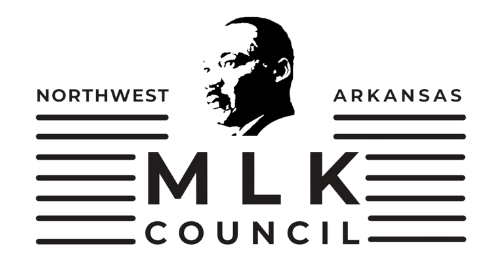REPRINT | Chaos or Community: Will Americans embrace empathy?
DR. RICKEY BOOKER
The “Still Dreaming…” segment will feature the timely reflections of an NWA MLK Council Member or another special community contributor. In our first edition, we are honored to share words from our invited guest, Dr. RL Booker.
Dr. Booker is a trainer, facilitator and consultant with the IDEALS Institute at the University of Arkansas Office for Diversity and Inclusion. His views are his own and do not necessarily represent the position of the University of Arkansas. In his personal blog and opinion pieces, he writes about his 16 years of experience working in higher education as a black man. He also pulls from his 20+ years of reading about and researching the history of America to highlight issues that we face today. His views are his own and do not necessarily represent the position of the University of Arkansas. Read more by Dr. Booker at: https://www.useyourkey.org/.
“Look at what so many people before us have been through. Look at how they were beaten down, attacked, and how everything in their lives was destroyed, and yet they kept choosing community.”
On a humid spring day in Montgomery, Alabama, a bus slowly pulled into the local station. The passengers could see a large mob. They held chains, baseball bats, and clubs.
James Zwerg gathered his courage and stepped off the bus. The crowd grabbed him and began to beat him. They beat him until he was knocked unconscious and hospitalized. He had a severe concussion, a broken nose, two black eyes, and three broken vertebrae. Several teeth were knocked out.
James' parents found out their son had been attacked when they saw his battered face on the front page of the Milwaukee Journal. Under the stress and shock of seeing their baby boy in a critical condition, his father suffered a heart attack, and his mother had a nervous breakdown. Enduring all of this, James had every reason to retreat and give up on hope for progress and community.
Instead, James said "We are dedicated to this. We will take hitting. We will take beating. We're willing to accept death ... until we can ride from anywhere in the South to anyplace else in the South." As a Freedom Rider in 1961, James Zwerg, a White minister, stood with the late Congressman John Lewis as they and many others were brutally assaulted for trying to bring our communities together.
I believe that to turn solvable problems into achievable solutions, we must first acknowledge our shared racial history. Next, we must engage in empathy-based conversations, and finally, we must decide where we go from here -- will it be chaos or community?
We live in a time in which some people unequivocally deny the lived experiences of those who for years have been marginalized and oppressed merely because of the color of their skin. For many elders in my family, this does not come as a surprise, as they experienced firsthand overt racism and subjugation that was on full display pre-1990s when White leaders decided to not only lock up mass numbers of Black men, but also give them harsher sentences than their White counterparts; or when Black people like John Lewis, Walter Gadsden, and Mae Francis Moultrie were attacked by police dogs and mobs of White people for exercising their rights to fight for full and equal citizenship; or when Black women were raped by Englishmen and forced to bear children who would ultimately become enslaved, despite being children of the enslavers.
This 402-year-old legacy cannot be forgotten or swept under the rug just because some Black folks have reached a prominent status in the dominant culture. We, all Americans, must come to the realization of what has happened in America by acknowledgment, reconciliation, and making amends before we can fully show up with empathy for each other.
Empathy has been defined as the ability to understand and share the feelings of another. According to Dr. John Maupin Jr., "most of us view life through our own eyes, but if you limit yourself to that one view you risk developing ... an incarcerated mind."
Having conversations about race with complete strangers can be difficult and scary, but such conversations can be even more daunting when it involves people within your inner circle or even your family. Theresa Wiseman, a nursing scholar, helps us understand how to deal with difficult conversations via empathy. She has identified four qualities of empathy: perspective taking, staying out of judgment, recognizing emotion in other people, and then communicating that emotion that you recognize. Empathy is a quality that must be honed and developed over time. One of the greatest models of empathy was Dr. Martin Luther King Jr. Because of his ability to listen to and understand people on all sides of a particular argument, he was able to continually engage with everyone.
Look at what so many people before us have been through. Look at how they were beaten down, attacked, and how everything in their lives was destroyed, and yet they kept choosing community.
In his 1967 book, "Where Do We Go From Here: Chaos or Community," Dr. King challenges Americans to wrestle with the fact that "this may well be mankind's last chance to choose between chaos or community." No matter how bad it feels right now, we are no different from those who came before us. The legacy of James Zwerg should be told in every household in America. He had a choice, just like all of us today, to choose between chaos or community.
Despite the frustration and, at times, pessimism I have often felt over the last two years, I like James Zwerg and John Lewis choose community. I encourage you to join me on this journey.

